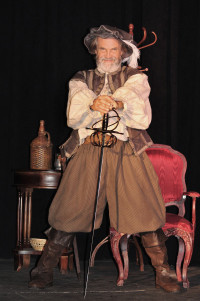Falstaff
At Theatre Inconnu
Starring Clayton Jevne
Adapted by Clayton Jevne from Robert Nye’s novel
Oct. 4 - 19th
Reviewed by Leah Callen
Sex! And now that Falstaff has your attention, let the laughter guide you somewhere unexpectedly divine. Clayton Jevne is incredibly authentic as he fills the boots of John Fastolf, a lusty English knight who is said to have inspired Shakespeare’s Falstaff. As he tells us tall tales about his wars and whores in rich detail, this one-man confession had me laughing, blushing, and crying. With characters such as Pistol and Shallow, you’re bound to crack a smile.
This storytelling is unapologetically profane, but surprisingly sacred and poetic at the same time. As Fastolf relives every sexual exploit of his life from the cradle to old age, we hear episodes that are both pornographic and beautiful – from a young woman’s creamy breasts and cherry nipples, to the butterflies that magically burst out of a bishop’s hand. Just when one may get too uncomfortable with all the innuendo about his “soldier,” “in a flash of sack” the story takes a soulful turn. Don’t let the prim music at the start fool you, though. Hold onto your seats! I felt my cheeks glowing in the dark.
Fastolf shares an intriguing point of view on some of the most famous medieval battles, witnessed from the edges of history. Audience members can get a little lost on this history map if they don’t have a built-in compass for it, but the accounts are so vivid that it doesn’t matter. While he miraculously conquers the French by throwing jewels and herrings at them, philandering Fastolf is conquered by chaste women. The saints slay his heart. Jevne paints a stunning image of Joan of Arc that is beyond human and, to me, the most bewitching part of the narrative.
Jevne’s full costume reminded me of a naughty Puss in Boots. The character certainly tries to spin his life in magical proportions, moving from the mindless thrusts of youth to the far sight of age. But Fastolf travels a touching arc from a hyperbolizing hedonist to one humbled. We see both a public and private persona in this play – a man embellished with bravado and the bare soul hiding inside him. As he spins these far-out tales, Jevne creates an iconic pose, his lower half leading the way. It suggests a character led by his worldly appetites. But he is reduced to his knees before God, turning away from the audience. The faceless humility of that pose is striking.
Though the protagonist is larger than life, Jevne’s masterful acting never fell into caricature. There was a natural flow to all his facial expressions and gestures that made the whole show feel genuine. It was enthralling, watching him light up with lust and melt gently into tears. Perhaps this play’s final wish is for us to be more promiscuous in our compassion and love for other human beings. When our lives fade out, which will be the most powerful memories left behind: our selfish joys or our random acts of humanity?
Leah Callen is an MFA student at UVic.

{ 0 comments… add one now }